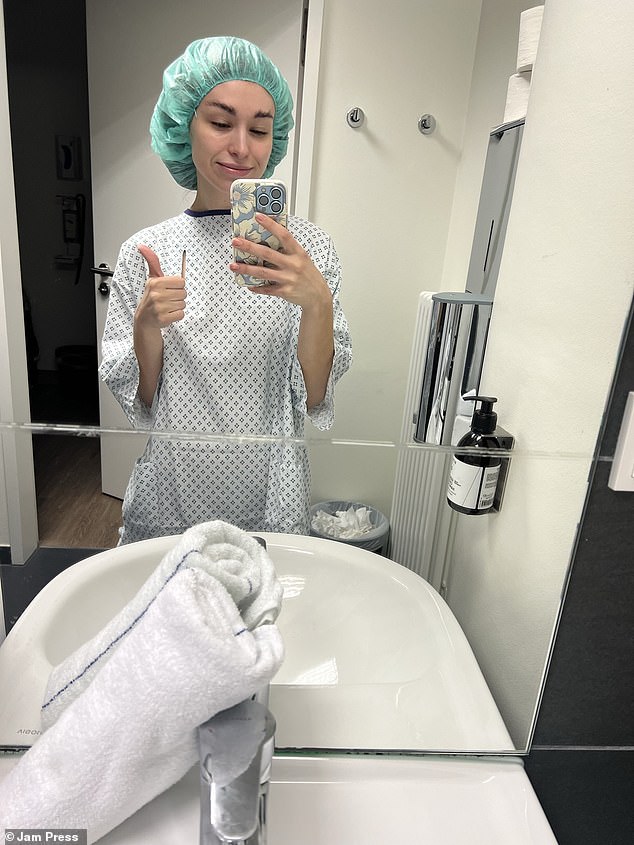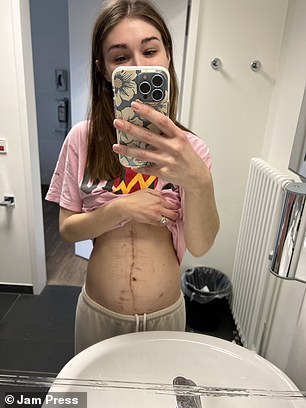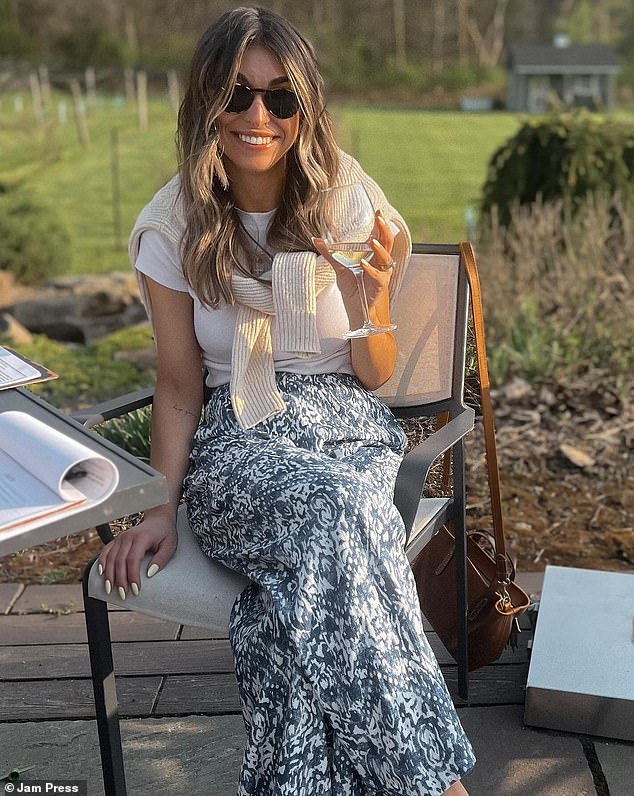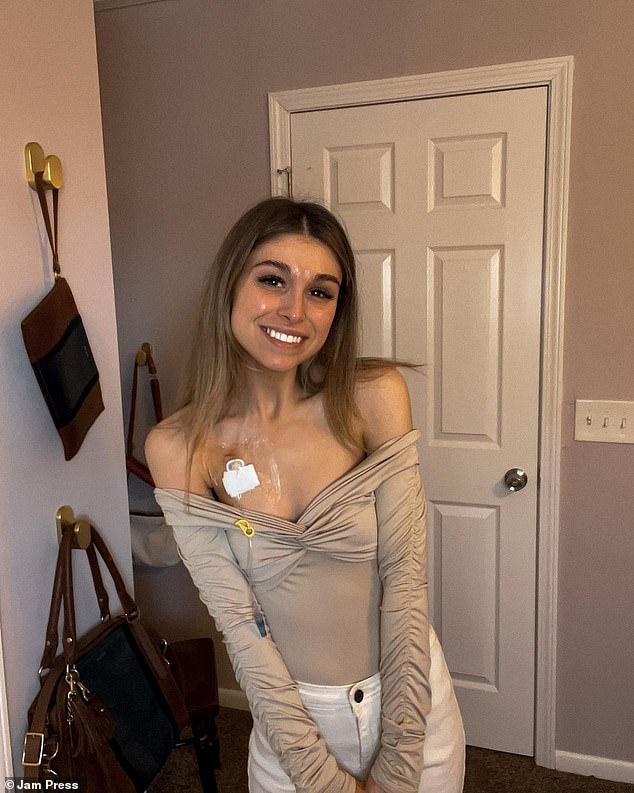Woman, 29, with ‘worst case’ of rare condition ‘doctors have seen’ travels 4,000 miles for surgery
A 29-year-old Ohio woman with a rare medical condition that left her in so much pain she couldn’t eat had to travel 4,000 miles to undergo life-saving surgery in Germany.
Kristina Bayus-Roszak, a marketing specialist, first noticed something was wrong with her health after losing 30 pounds in just six weeks because she was in excruciating pain that made it nearly impossible for her to eat.
She suffered from constant nausea, vomiting and severe abdominal pain.
Doctors eventually diagnosed her with Dunbar syndrome, a rare disease that affects only two in every 100,000 people in the US.
The disease, also known as median arcuate ligament syndrome, is a condition in which the arc-shaped band of tissue in the chest area – the median arcuate ligament – presses on the celiac artery, which supplies blood to the upper abdomen.
Ms Bayus-Roszak had her artery pinched in several places, leading to more severe symptoms and pain.
After her diagnosis, she was told she had only two years to live if she did not undergo life-saving surgery to repair her celiac artery, a surgery she said no American doctor would perform.
Kristina Bayus-Roszak, 29, was told she had just two years to live if she did not undergo surgery to repair compression on the artery that supplies blood to her abdomen

After losing 30 pounds in six weeks, she was diagnosed with Dunbar syndrome. She traveled from her home in Ohio to Germany for surgery
Mrs Bayus-Roszak said: ‘My case was one of the worst they had ever seen. My body was going to pieces. I was slowly dying of hunger.’
Desperate and without any other solution, she flew to Leipzig, Germany, to be examined by a highly specialized doctor.
Once there, she was given an advanced ultrasound and diagnosed with five extremely rare conditions, all characterized by similar abdominal vascular compressions.
She was then sent to Düsseldorf for an eight-hour operation to cut the band of tissue compressing the artery, relieving the pressure and restoring blood flow to the abdomen.
Her surgeon also discovered an abdominal aneurysm – an enlargement of the abdominal portion of the aorta, the largest artery in the body – that would have ruptured within a month if it had not been found.
She said: ‘My husband Kyle made the journey with me and I couldn’t have done it without him.

She said the operation performed in Dusseldorf saved her life and greatly improved her health
“My friends and family have also done multiple fundraisers and a GoFundMe to help me get there. I wouldn’t be where I am today without their love and support.”
Two years after the procedure, Ms. Bayus-Roszak’s life has improved tremendously.
She said: ‘My surgeon has been nothing short of extraordinary. I am doing so much better and I can eat again, which I will never take for granted again.’
She has slowly regained weight and her organ health has improved significantly.
‘I also no longer have chronic pain and can do the things I love again, such as walking. I have my life back,” she added.
Surgery, like Ms. Bayus-Roszak’s, is the only treatment for Dunbar syndrome.
Ms Bayus-Roszak added: “I am so proud of my ability to keep this going. There was nothing easy about traveling abroad for major surgery. I wasn’t even sure if I would survive.
‘However, I survived and although it was the hardest thing I have ever faced, I made it through and I am a stronger and better person because of it.
“I wish people knew how incredibly strong people with vascular compressions and rare diseases are. Research and treatment options are limited, and half of medical professionals don’t even understand it.
“My goal now is to raise awareness and provide relief to so many others who suffer from these debilitating and even fatal rare diseases.”

She can now eat normally and enjoy life as she did before she became ill

She hopes her experience with an ultra-rare disease that affects about two in every 100,000 people will inspire other people to share their own stories and struggles and also stimulate research.
Rare diseases are notoriously difficult to treat due to the limited therapeutic options available.
Because some diseases are so rare and affect a relatively small portion of the population, pharmaceutical companies have little financial incentive to develop new treatments or cures, since few people will actually buy them.
According to The Lancet Global HealthThere are no approved treatments for approximately 95 percent of rare diseases.
Most rare diseases – 80 percent – are genetic and almost 70 percent occur during childhood.
There have been major breakthroughs in rare disease research, including genetic testing to diagnose rare neurological disorders and the passage of the Orphan Drug Act of 1983, which provides tax breaks for rare disease research and drug development.
But the report’s authors said: ‘Even if we have treatments, there is no promise of accessibility for everyone.
‘Hemgenix, for example, a gene therapy for the treatment of hemophilia B… costs up to $3.5 million per case in the US.’
They added: ‘Insufficient awareness among healthcare staff and the community about their rare disease can lead to patients’ symptoms not being recognised. Visible symptoms of the disease can lead to social discrimination and schools and employers may fail to address accessibility needs.”
Ms Bayus-Roszak said: ‘We fight for care every day, even when we are dealing with the most brutal pain and symptoms. If you have someone in your life who is struggling with a chronic illness, rare or not, please give them some grace.
“Remind them that they are loved and that they are worth it. Understanding and kindness will go a long way.”
